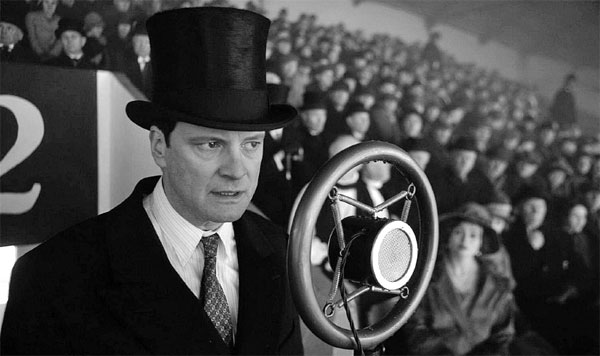Balancing eloquence and silence
British actor Colin Firth dwells on the virtue of restraint in a wide-ranging conversation with Raymond Zhou on the art of acting.
Colin Firth joked that he was looking for offers in Chinese films, adding that he hoped to work with Chinese directors Zhang Yimou, Feng Xiaogang, Chen Kaige, Lou Ye and Jia Zhangke, to name a few.
The light-hearted revelation came at the end of an hourlong talk, moderated by yours truly, which was designed to encompass the highlights of an illustrious career of the much honored British actor.
Titled "A Colin Firth Retrospective", the conversation was, in turn, part of a program for the 2016 China-Briton Film Festival held in the Beijing suburb of Langfang.
|
Colin Firth wins Academy Award for best actor for The King's Speech in 2010. Provided to China Daily |
|
Firth's appearance in China-Briton Film Festival in Beijing attracts a large number of fans. CFP |
|
Left: Firth receives a lifetime-achievement award at the Beijing film festival. Right: One of Firth's best-known films, A Single Man. CFP |
Firth received a lifetime-achievement award at this festival when it opened on Dec 12.
The 2010 Academy Award winner for best actor (for The King's Speech) did not randomly pick a few big names from China's booming film industry to please the host country. He did his due diligence.
He was impressed by how seamlessly American actors Tim Robbins and Adrien Brody fitted into Feng's epic tale on the 1942 famine. He liked Lou Ye's 2012 movie Mystery and, when I explained that Chen's Farewell My Concubine is widely viewed as the best Chinese film in history, he chimed in, saying it was one of the best in world cinema.
And he was plugged in to the latest in Chinese showbiz, aware of the publicity blitz whipped up by The Great Wall, Zhang's epic tale of fighting monsters on the best-known Chinese landmark, which would premiere in China in a few days. It is a Sino-US co-production that stars Matt Damon.
Asked about ideal projects that require the pooling of talents from both China and Britain, Firth cites a story by Japanese-British author Kazuo Ishiguro, set in 1930s Shanghai and centering on a group of displaced expatriates, as the perfect example for cultural fusion that lends itself to big-screen treatment. The White Countess, made by the multinational team of James Ivory and Ismail Merchant, was released in 2005.
"I don't think I would have any chance of delivering dialogue in Mandarin convincingly without understanding what I was saying," he says responding to my hypothetical question that his role in a Sino-British co-production would require him to speak some lines in Chinese. "I can't just listen to the phonetics. When I read words on a page, written by someone else, my job is to own them. I have to make sense of them emotionally, mentally and psychologically. I have to take the words you gave me, be told how you say them musically, which would be a huge challenge, and then own them."
The art of silence
With solid training from Drama Centre London, Firth displays a mastery of dialogue that ranks him with the best of his British peers. Ironically, his most pivotal roles did not require him to speak long Shakespearean lines as if letting pearls roll off satin sashes.
For his breakout performance in the 1995 BBC adaptation of Pride and Prejudice, he spent a lot of time staring out of the window, he says. "And I was on screen only about 20 percent of the time," and the script usually specified little more than "staring".

Chinese fans still scream at the mention of the name Darcy even though the current generation, amply represented in the audience, was only born in the years when the six-part series made its first splash on TV, including the Middle Kingdom.
"I would be curious to see what the fuss is about," Firth says, explaining that he had not watched the series in two decades.
In A Single Man, Firth, in the role of a gay British university professor living in Southern California in the 1960s, resorted to silence rather than language to convey the pervasive sense of loss and grief.
He recounted that he did not know fashion or Tom Ford, the fashion designer who wanted to make his directorial debut with Christopher Isherwood's novel of the same name. Firth took a risk and it paid off handsomely, winning him a British Academy of Film and Television Arts award for best actor in a leading role and an Oscar nomination.
He did not play up the gayness of the character. "The fact he was gay was probably number eight out of the 10 qualities of this character," he explains.
Give your roles dignity
"Never play the emotion," Firth says that's how he was taught in drama school. "You find emotion. You experience it. But don't act the emotion because that's not real life. Nobody walks into a room with the intention to be sad or angry. What you usually see people doing is to manage that emotion. If they don't manage it, that's because the emotion is too big for them. We are usually much more moved with an actor struggling with his tears than just exhibiting tears. The same is with rage or sadness. That's the chance to play the dignity. You should have some managed relationship with your emotions. It sounds convoluted, but it's a critical thing with acting. I see it with every great actor. "
That was exactly the approach Firth took toward the titular character in The King's Speech. He prepared by listening to the speeches of George VI, but "rather than trying to sound like him, I tried to sense what he felt. I could hear the difficulties." He was especially moved by one particular moment "that wasn't the pain of the stammer, but the dignity with which he fought the stammer". There were a few seconds of terrible silence that was "very eloquent to me about what he was experiencing".
Even after filming had ended, the stammer still interfered with the actor's speech patterns. "When I think about stammering, I start to lose my rhythm and fall over my words." It was a "physiological thing" that Firth had discovered while researching the character.
Fortunately he had been warned and helped by Derek Jacobi, "one of our greatest actors in Britain," who had famously played Claudius in I, Claudius, a real-life character with a stammer. The speech impediment stayed with him for about six months and then went off. "It was a normal thing, so don't panic," Firth was told by his predecessor.
Firth sees acting as "a journey of imagination". The actor does not really go through the things the character does, but in his mind he does, which is like "disappearing into the world of a book or a movie or a play and feels it's still part of your living after it's done."
Behind the scenes, Firth was also a perfect embodiment of the English gentleman, which he portrays so vividly on screen, punctual to the minute and courteous to everyone. When asked about the secret formula for this image, he laughs it off: "It's just the suit."
Contact the writer at raymondzhou@chinadaily.com.cn
(China Daily USA 12/19/2016 page7)



















